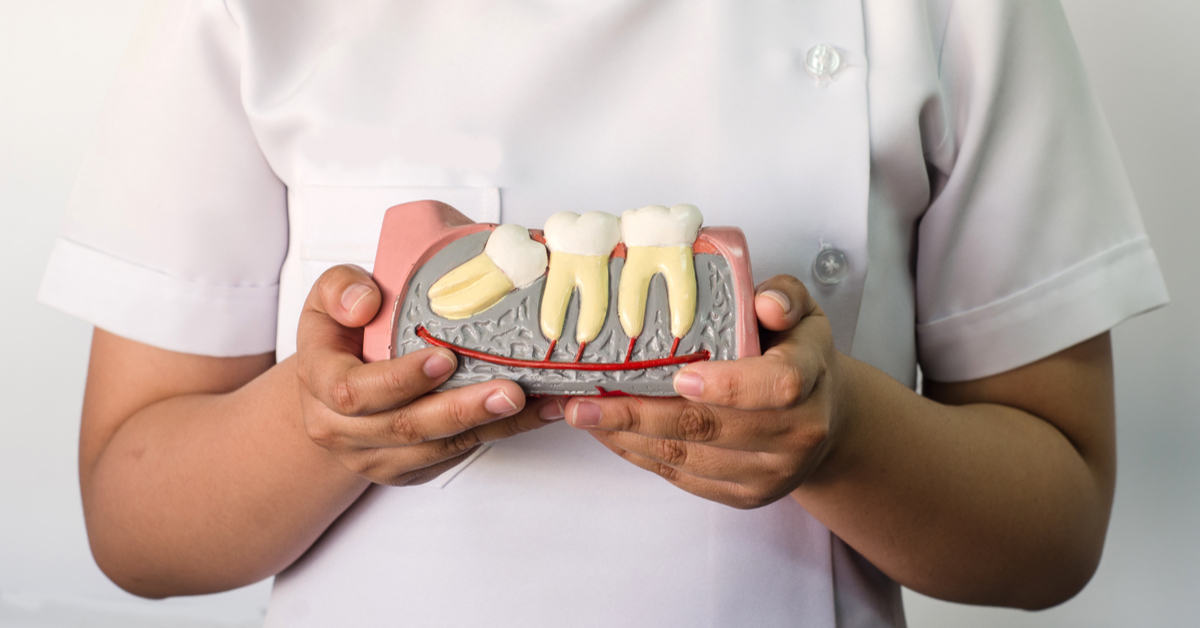
Having your wisdom teeth extracted can be a bit of a daunting prospect, especially if it's your first time or you're having more that one tooth out at once. With so many people having their wisdom teeth removed, and oral surgeons recommending taking them out before they even start to cause problems, you're probably wondering why we even have wisdom teeth in the first place!
The evolution of the wisdom tooth is an interesting one to examine. We're here to answer all of your FAQ's and deep dive into the mysterious 'third molar' with our wisdom teeth fact sheet.
What are wisdom teeth?
- Sometimes referred to by dentists as ‘third molars’, people develop wisdom teeth on both sides of the upper and lower jaw, usually between the ages of 17 and 24. While some people have a set of four wisdom teeth, others have none at all.
- They’re the final set of teeth to emerge in a human’s life and are subsequently named ‘wisdom teeth’ as you’re presumably wiser when they emerge.
Why do we have wisdom teeth?
Many people have asked the question - if we don't really need our wisdom teeth, then why do we develop them in the first place? The answer can be found in our anthropology, lineage and genetics.
- The human ancestor subsisted largely on a diet of raw meats, roots and leaves. They didn't have the privilege of cooked food and convection ovens, and therefore needed an extra set of molars to grind down their foods in their raw form. Of course, through evolution our palates have changed and we prefer softer foods. We also have the means to cook, soften and cut our foods, making our wisdom teeth redundant.
- Over time, human's physiology has also changed and developed. Once upon a time, we had the jaw capacity to house an extra set of molars. The 2019 human typically doesn't have enough room in their mouth to fit wisdom teeth once they emerge without impaction.
Why do wisdom teeth come through so late?
- Tooth development takes place in a chronological and organised order. Your adult set of teeth begins to grow over a course of years from ages 6-12. Wisdom teeth are the last to actually begin to form, around age ten. Because of this, they're also the last in the timeline to erupt in the mouth.
Why do wisdom teeth need to be removed?
Occasionally, wisdom teeth do come through later in life and cause no complications. If there's enough room in your jaw to accommodate the new teeth, and the erupt on a good angle without touch any of your nearby molars, you won't need to have your wisdom teeth removed. However, they are notorious for complications resulting in extraction - here's why:
- Your wisdom tooth hasn't emerged at all and is impacted (or trapped) within your jaw. This can be extremely painful, and sometimes result in infection, a cyst, or damage your teeth roots and bone. In this case, you'd need to have your tooth surgically removed.
- Your wisdom tooth has only emerged partially through your gums. Once your tooth has cut through the gum, it's easy for bacteria and food residue to become trapped and cause an infection. As these teeth are right at the back of your mouth, this area can be quite difficult to clean, increasing the risk of infection.
- There's too much crowding in your mouth, and there's no room for your wisdom teeth to go. This can result in your wisdom teeth pushing against your other teeth, moving them out of line and possibly damaging them.
How do you know if you need your wisdom teeth removed?
There are a few tell-tale signs you can look out for if you suspect your wisdom teeth may be causing issues.
- If you're experiencing pain when biting down or opening your mouth on one side, and the gum around your back molar seems inflamed, this could be sign of infection as a result of an impacted wisdom tooth.
- Headaches, stuffiness, and sinus aches can often be symptoms of a wisdom tooth issue at play. While your wisdom teeth roots develop, they can push the sinuses located right above your teeth.
- The roots of your wisdom teeth are deep, and can have an impact on your jaw. If you're experiencing swollen lymph nodes, stiffness and jaw pain, it's likely your wisdom teeth are the cause of the issue.
Of course, there's no substitute from seeking professional advice if you're experiencing any of these symptoms. Get in touch with our team for a consultation.